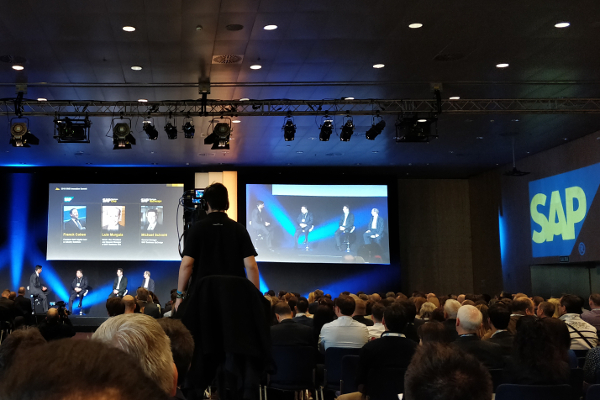We have just returned from the SAP SMB Innovation Summit 2018 in Barcelona, where SAP and its extended ecosystem of EMEA partners showcased their various solutions. This year’s event demonstrated an impressive array of innovation, and ‘fluffy buzzwords’ gave way to tangible applications of familiar technologies.
There were important announcements about the SAP Business One technology as well as insights into how future technology will impact the business landscape.
1. SAP is doubling down on its cloud offering
Digital transformation, consumption models and accelerated development are all driving growth in the cloud market. And out of six top EMEA markets, the UK is predicted to be the fastest growing cloud market, with a 14% spending increase in ERP from 2017 to 2021.
With cloud ERP spend likely to reach €2.9 billion in 2021, i is no surprise therefore that SAP was keen to demonstrate that it is strengthening its commitment to the cloud. There will be a closer alignment between SAP Business One and SAP Business By Design, SAP’s public cloud solution. Expect to see expertise being shared between products and SAP Business One becoming more dominant in the cloud space.
Also, the cloud drive is relevant to both public and private cloud, so that’s both partner-hosted and SAP-hosted cloud solutions.
2. SAP Business One 9.3
SAP Business One 9.3 has been available under the “Early Adopter Care Program” since autumn last year. At the SMB Innovation Summit, we were treated to detailed presentations on this latest release that demonstrated some exciting new functionality, including:
- Improved data analysis is possible, with integration with Office suite programmes, including building reports in Excel and pulling fields from SAP directly within Excel
- Artificial intelligence is utilised to bring intelligent forecasting methods to Material Requirements Planning (MRP) activities and to help with upselling and cross-selling. Using sales correlation analysis, the system can flag up to a sales rep that another item is often purchased with the product in question. For example, if a customer is buying a duvet cover, it may suggest the matching pillow cases.
- The system has invoice recognition functionality that automatically turn documents into actionable data
- The latest release incorporates a native cloud user experience. Its a web client that was designed to meet user requirements
- A very timely aspect of SAP Business One 9.3 is that it was built to meet a number of GDPR requirements
3. SAP Cloud Platform
The SAP Cloud Platform provides a number of benefits for SAP Business One development. Separate from SAP Business One and HANA, it acts instead as a loosely coupled platform on top of the core software. Partners can develop directly within the platform, and the development is managed and overseen by SAP within the platform.
SAP announced an expansion of the applications that are available on the cloud platform. This emphasises the company’s commitment to growing the functionality of its extended ERP solutions, driving digital transformation in small and medium-sized businesses. There are nine key applications currently held within the SAP Cloud Platform:
- Machine learning
- Mobile
- Blockchain
- Artificial intelligence (AI)
- API Hub
- Service Provider Solutions
- Analytics
- Internet of Things (IoT)
- Cloud technologies
4. Artificial intelligence is no longer just a buzzword
For SAP, artificial intelligence is no longer just a tech buzzword. The company demonstrated a number of practical, real-world applications of the much-publicised technology:
- C-suite executives are using voice and intelligent analytics to quickly access relevant data.
- Facial recognition is being used in retail environments for mood recognition and to inform companies about their customer demographics. In turn, this behavioural and demographic analysis is being used to make more-tailored offerings
- A Chinese chicken farm is using artificial intelligence to assess the health of its hens. Five visits a day from experts are usually required to pick up on signals of respiratory disease in the hens. But with the application of audio samples and machine learning, the company has been able to compete with humans, achieving 92% accuracy.
5. Digital transformation
Digital transformation was a key talking point at the SMB Innovation Summit 2018. It’s important for businesses to be ready for the digital economy and SAP is building foundations on which digital transformation can be built.
SAP Business One acts as a digital hub in the digital economy. It sits in centre, managing and integrating various digital platforms and devices, including IoT sensors and products, mobile devices, apps, ecommerce and social media, along with machine learning, chatbots and intelligent digital assistants like Alexa and Google Home.
There are three main levels at which digital transformation can be applied. The first is business model transformation – using technology to generate new methods of profit creation. This is the top tier of digital transformation and is the most difficult to implement. It’s about transforming and disrupting entire business models, as seen with the likes of Uber, Airbnb and so on.
The second, mid-level, is operating model transformation, where a company doesn’t change what it does to make money, but instead changes how it does it. For example, using automation and robots to replace human workers, as seen with warehouse automation.
Finally, the third level, is business function optimisation. This encompasses leveraging new technologies, but not changing the way you operate. So, rather than replacing workers, you instead give them superior tools and technology that helps then do their jobs better.
We enjoyed an informative three days in Barcelona at the #SMBSummit2018. It was great to learn how SAP is focusing on helping SMB customers to grow and to excel.
If you would like to learn more about SAP Business One, call us on 020 8819 9071 or get in touch. We’d be delighted to demonstrate how the business management software can help your business.
